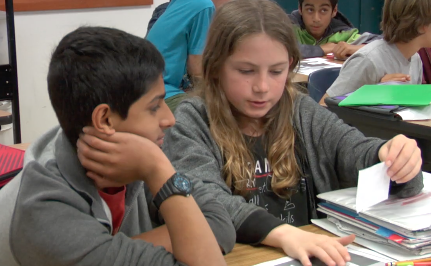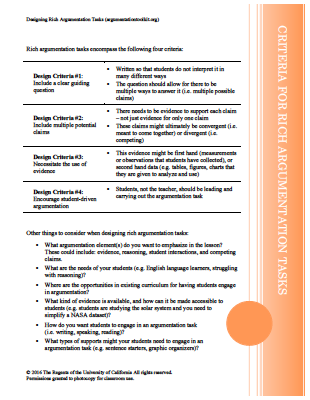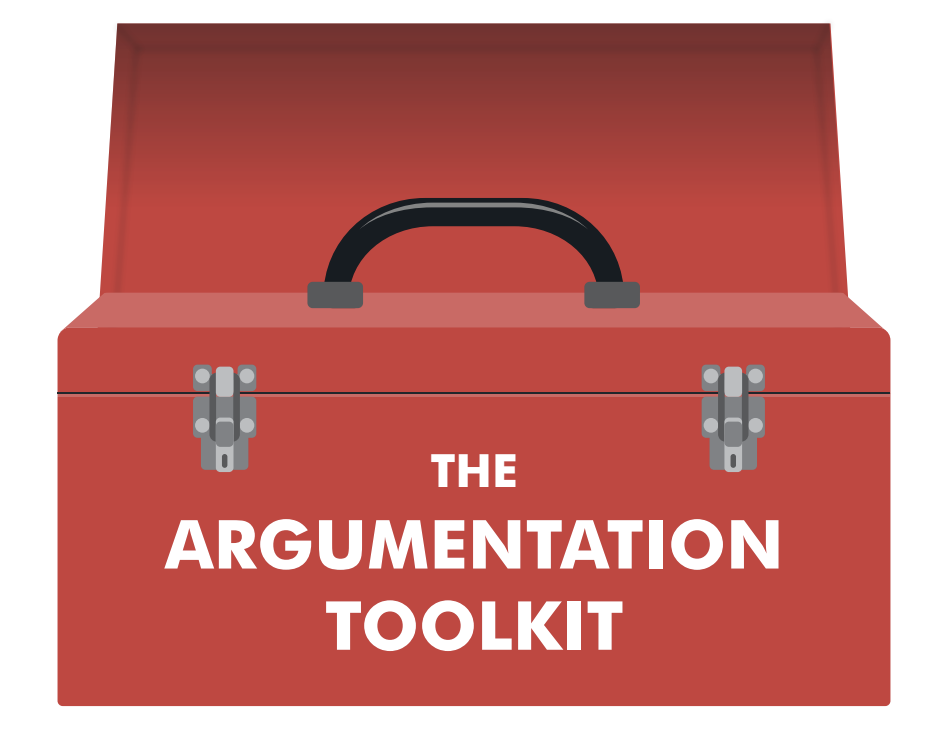How can you support students to evaluate the quality of evidence?
Advanced – Designing Rich Tasks, Session 2
Session Goals:
- Teachers will be introduced to key criteria and other things to consider when designing rich argumentation tasks.
- Teachers will consider how various instructional activities (e.g. Evidence Gradient Tool, Anticipation Guide) align with the key criteria for rich argumentation tasks.
- Teachers will be introduced to the Evidence Gradient Tool as an instructional activity that supports students in evaluating the quality of evidence.
- Teachers will design a new lesson or revise an existing lesson to integrate a rich argumentation task into their science instruction.*
- Teachers will identify areas of argumentation that are challenging for their students.*
*Note: These final two goals are only applicable if the module is implemented as multiple sessions

Session Slides:
Advanced Designing Rich Tasks, Session 2 PDF
Agenda:
*Extension Discussion – Analyze an argumentation task within a lesson!
- Video & Discussion: Using the evidence gradient tool
- Activity: Evaluating evidence with the evidence gradient tool
- Discussion: Supporting student discussions about evidence
- Connection back to design criteria
*Extension – Try it with your students!
*Extension Discussion – Analyze an argumentation task within a lesson!
Share your experience:
- Share the lesson you analyzed, as well as any notes you took
Discussion Questions:
- Were any of the design criteria strong in the argumentation task you analyzed? Why do you think so?
- Were any of the design criteria weak in the argumentation task you analyzed? Why do you think so?
1. Video & Discussion: Using the evidence gradient tool
Click here for a reminder about the criteria for designing rich argumentation tasks
Watch the video below, which provides an introduction to the evidence gradient tool.
Discussion Questions:
- What challenges have you experienced supporting your students in evaluating the quality of evidence?
- What different ways could you imagine using the evidence gradient tool to help students assess the quality of evidence?
2. Activity: Evaluating evidence with the evidence gradient tool
Before conducting this activity, consider and discuss the following questions:
- What are sources you would trust to provide high quality evidence? Why would you trust these sources?
- What are sources you would not trust to provide high quality evidence? Why would you not trust these sources?
The task (Part 1):
- Use the evidence gradient tool to sort the possible evidence cards according to their source. Place those that are of higher quality at the top of the gradient tool, and those that are of lower quality at the bottom
- Make sure you articulate why you rank cards as you do
- Once you have completed the task, share your work with another group and discuss any disagreements you may have
The task (Part 2):
- Eliminate cards that you ranked of low quality in terms of source
- Use the evidence gradient tool to rank the remaining evidence cards in terms of how well they support the claim – Ocean currents impact baby American eels’ chances of survival. Place those that best support the claim at the top of the gradient tool, and those that support it least at the bottom
- Make sure you articulate why you rank cards as you do
Discussion Questions:
- What did you talk about when you were discussing the source of the possible evidence?
- Were any cards difficult to rank? Why?
- How can you envision your students engaging in this activity? What would work well? What challenges would they have?
3. Discussion: Supporting student discussions about evidence
These are strategies that could support students’ discussions about evidence:
- Modeling discussions using the evidence gradient tool
- Focusing on one criteria for high quality evidence at a time (e.g. source, manner by which data was collected)
- Circulating the room and encouraging students to discuss the quality of evidence
- Pausing and highlighting strong discussions
- Avoiding a focus on the right answers, and instead emphasizing the importance of the process
Discussion Questions:
- Are there other strategies that you use to support student discussions around evidence?
- What are benefits of having your students discuss evidence?
4. Connection back to design criteria

Click here for a reminder about the criteria for designing rich argumentation tasks
Think-pair-share:In the activity you just completed, which design criteria do you think the argumentation task aligned with well?Which design criteria do you think the argumentation task did not align with?How could you redesign the argumentation task to better align?
*Extension – Try it with your students!
The task:
- Develop or revise an argumentation task within a lesson to encourage students to evaluate the quality of evidence. This task could include using the evidence gradient tool or it could be another type of activity.
- Remember to consider the key design criteria when completing this task.
- For the next meeting, bring the argumentation task you developed, as well as potentially student artifacts (such as a video clip) of students engaged in this.
View Other Sessions
Advanced Designing Rich Tasks Agenda
| Session Name | Description | Length |
|---|---|---|
| Session #1: What design criteria support rich argumentation tasks? | This session introduces four criteria and other considerations when designing rich argumentation tasks. | 45 minutes |
| Session #2: How can you support students to evaluate the quality of evidence? | This session incorporates an Evidence Gradient Tool as a means to support students in evaluating the quality of evidence. | 45 minutes |
| Session #3: How can you support students to revise their thinking given new evidence? | This session uses an Anticipation Guide to explore ways to support students in revising their thinking given new evidence. | 45 minutes |
| Session #4: Work session – designing a rich argumentation task | This session provides teachers with work time to develop or revise a lesson that includes a rich argumentation task. | 45 minutes |

